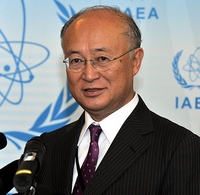After a protracted election campaign, the 35-member Board of Governors of the International Atomic Energy Agency (IAEA) finally selected Yukiya Amano of Japan as its next director general earlier this month. Amano's tenure will begin following the retirement of current IAEA head Mohamed ElBaradei at the end of November.
Ambassador Amano will certainly face no shortage of challenges when he begins his four-year term. As detailed in a 2008 report (.pdf) by a panel of senior experts, the IAEA must surmount major weaknesses if it is to manage the surge in dangerous nuclear material that will result from the growing number of countries with plans to launch new nuclear energy programs, or expand existing ones, in coming years.
One core problem is that the existing system of IAEA safeguards is inadequate and incomplete. The Nuclear Non-Proliferation Treaty (NPT), which entered into force in 1970, empowers the IAEA to verify compliance with its provisions. The treaty requires non-nuclear weapons states to complete a "comprehensive safeguards agreement" with the IAEA within 180 days of signing the NPT. These agreements oblige treaty parties to provide the IAEA with detailed accounting records of all movements, transactions, and other actions involving their nuclear material. The agency then attempts to verify these declarations through monitoring and other measures designed to deter or detect the possible diversion of nuclear items for illicit purposes.

